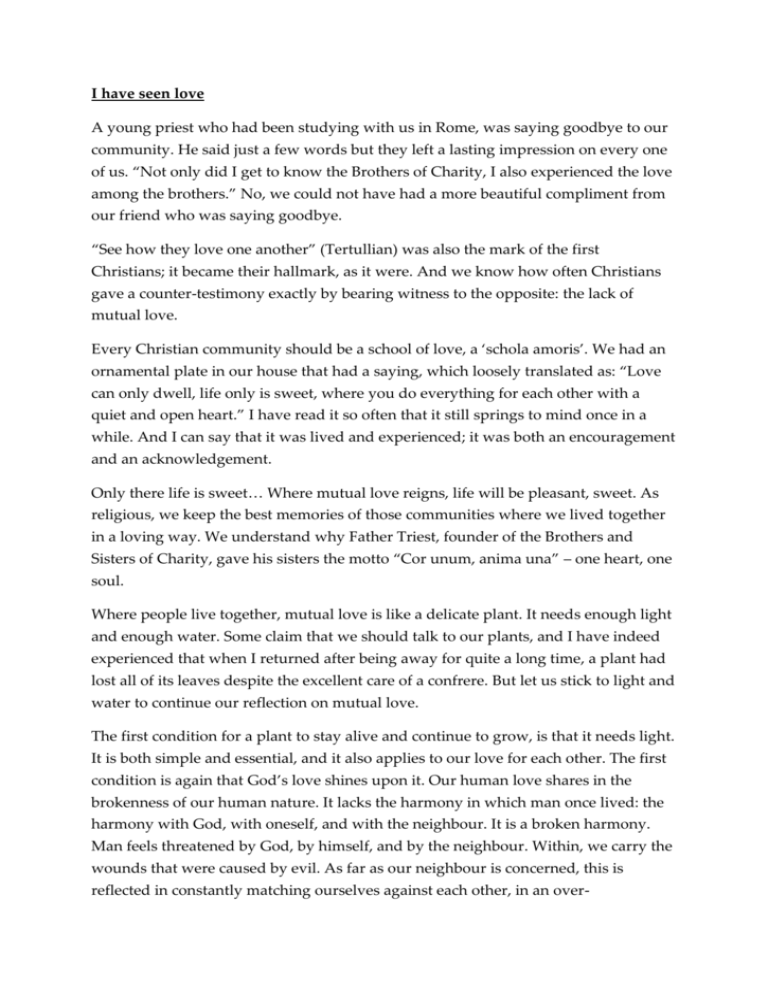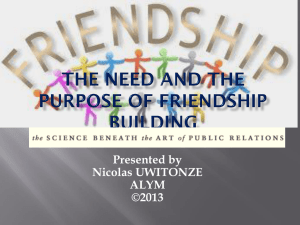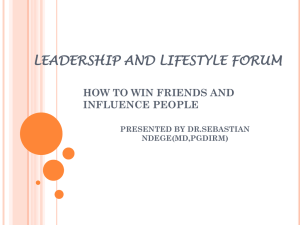I have seen love A young priest who had been studying with us in
advertisement

I have seen love A young priest who had been studying with us in Rome, was saying goodbye to our community. He said just a few words but they left a lasting impression on every one of us. “Not only did I get to know the Brothers of Charity, I also experienced the love among the brothers.” No, we could not have had a more beautiful compliment from our friend who was saying goodbye. “See how they love one another” (Tertullian) was also the mark of the first Christians; it became their hallmark, as it were. And we know how often Christians gave a counter-testimony exactly by bearing witness to the opposite: the lack of mutual love. Every Christian community should be a school of love, a ‘schola amoris’. We had an ornamental plate in our house that had a saying, which loosely translated as: “Love can only dwell, life only is sweet, where you do everything for each other with a quiet and open heart.” I have read it so often that it still springs to mind once in a while. And I can say that it was lived and experienced; it was both an encouragement and an acknowledgement. Only there life is sweet… Where mutual love reigns, life will be pleasant, sweet. As religious, we keep the best memories of those communities where we lived together in a loving way. We understand why Father Triest, founder of the Brothers and Sisters of Charity, gave his sisters the motto “Cor unum, anima una” – one heart, one soul. Where people live together, mutual love is like a delicate plant. It needs enough light and enough water. Some claim that we should talk to our plants, and I have indeed experienced that when I returned after being away for quite a long time, a plant had lost all of its leaves despite the excellent care of a confrere. But let us stick to light and water to continue our reflection on mutual love. The first condition for a plant to stay alive and continue to grow, is that it needs light. It is both simple and essential, and it also applies to our love for each other. The first condition is again that God’s love shines upon it. Our human love shares in the brokenness of our human nature. It lacks the harmony in which man once lived: the harmony with God, with oneself, and with the neighbour. It is a broken harmony. Man feels threatened by God, by himself, and by the neighbour. Within, we carry the wounds that were caused by evil. As far as our neighbour is concerned, this is reflected in constantly matching ourselves against each other, in an over- sensitiveness to what others say or do, in thinking that we are better than others. Mutual love so easily changes into indifference, envy, hatred. The worm of envy is never far away, and so often we allow our love to depend on the others’ behaviour and attitude. In a word, we are all hurt, hurt in our ability to love. Fractures, injuries, and wounds require healing. Our wounded love has but one Healer: God, who can restore our human love to its original pure state. It is an in-depth recovery, but it does require a constant intervention of the divine Healer. That is why we must be open to God’s love every day, be aware and increasingly become aware that God is there with his love for us. God’s love must shine upon our human love and raise it to a divine level. If our human love is limited, conditional, totally dependent on our emotions, it will become unlimited, unconditional, and radical through divine love. God’s love will shine in and through our human love. More than that, through our human love, transformed by divine love, people start to experience that God is love. God’s love needs human love to manifest itself in the world. It is as though the incarnation is continued by it; God manifest himself through man and in man, and as such He aims to establish his kingdom among men. That which happened in Mary, should also take place in us: that fundamental openness to the Word of God so that the Word might become alive within us. “You see before you the Lord's servant, let it happen to me as you have said,” should also be our words. It is that which Christ was constantly wondering, how He could fulfil the will of his Father. When the Word of God starts to live within us, when we place ourselves under his will, God’s love will present itself in us and fulfil us. God’s love is like God’s grace: it requires us to be open to it as men and to respond to it. It becomes our participation. Again, it is like Mary and the Incarnation: she is asked to open up to God’s invitation and to take part in it. She will have to renew her consent daily, be faithful to it, and from now on take every step in her life with God. It is her walking with God’s Word, with God’s grace, with his love. We must also make that double movement in our lives: open ourselves to the light of God’s love and continue to walk in that light. This is where we make the transition from a rather passive being open to a more active walking the path. In addition to placing our plant in the light we must also give it water. The love for the neighbour needs to be nurtured, and our human effort of nurturing should be entrusted to God’s grace. In everything that we undertake, a continuous purification should take place, including in our mutual love. On the one hand, we are all longing for love and, on the other, we experience how difficult it is to live this love in a pure way and to extend it to several people. Selfishness is present in all of our actions, and therefore in love, as well, and in love it manifests itself in desire. We wish to have our friend all to ourselves, and, instead of approaching him with open arms, it turns into selfish grasping. True love, however, always involves gift and surrender. I open myself to the love of my friend and I ask myself what I can do for him, what I can mean to him. In this mutual openness, love can flourish. In love, the other’s well-being is the most important thing, and we rejoice when the other is happy. Purified love is always a love that is considerate of the other in which the other’s well-being takes precedence over personal pleasure. It will always be our task, even in the most intimate love, to purify the desire for pleasure and ultimately find pleasure in the well-being of others. In every love of friendship – for this is what we are discussing – the sting of desire is hidden. We need to realise this, we must not be afraid to say it, we must not neglect it or act as though it does not exist. If we close our eyes to it, it might happen that it continues to grow silently and suddenly takes us by surprise with great violence. We are “neither angel nor beast” but as men we have the task to free desire from its selfishness and transform it into a positive force that can add more depth, more intensity, call it more fruitfulness to our love. We should stand before God with our desire and pray that He will restore it to its original pure state. For desire as a passion is not wrong as such but it has been corrupted by evil and transformed into a selfish grasping. We must allow our human love with its desire to be shined upon by God’s love so that it might once again be tied to its divine roots. It is the first task that we face: allowing love to grow naturally in our hearts, being glad to share a life of love with others, but making sure that this love remains pure and is purified still. Love has the power to boost this growth process within but it will grow to perfection if it is rooted in its true origin, in God’s love. The love of friendship grow naturally when it comes to a number of people who we consider our friends, and it is a true grace to be able to live in such love of friendship. We should cherish it, put energy into it, make good time for it. At the same time, we must try to keep this love of friendship open. We cannot expect that all with whom we live become our friends but we should keep that possibility open. The obligatory fraternal and sororal love that we develop for those for whom we feel no love of friendship whatsoever, should find nourishment in the fruits of the love of friendship. Perhaps we could say that our ability to love grows in our love of friendship and enables us to love those for whom we emotionally feel nothing at all, even for those who repel us. Of course, this is where we enter the heart of the commandment of love that was given to us by Jesus with the urging invitation to love those who do not love us at all. Every community that we are part of will probably consist of the following groups: a number of friends with whom we share the love of friendship, a number of people with whom we have no problem to lovingly live together in peace and mutual respect, and a few people we have to place under the commandment of love for whom we have to make an effort to approach them in a loving fashion. Perhaps it was this combination of love that our priest-student had noticed in our community. In his search for love and friendship, Saint Augustine came to realise that it was not possible to be friends with everyone. However, he said, we should keep the possibility of friendship open for everyone. Friendship should grow on both sides, and that is why we, from our side, should ask ourselves what stands in our way to allow friendship to grow. If we believe and profess that God is love and that He created us out of his love and because of his love and that He gave us the neighbour to share in this divine love, we cannot but put a great deal of energy into love and into friendship as the place of love. And, at the same time, we should realise that, before all things, love is a gift to which we should simply be open.





